II. The Literature of Reason and Revolution
- 格式:doc
- 大小:42.00 KB
- 文档页数:5
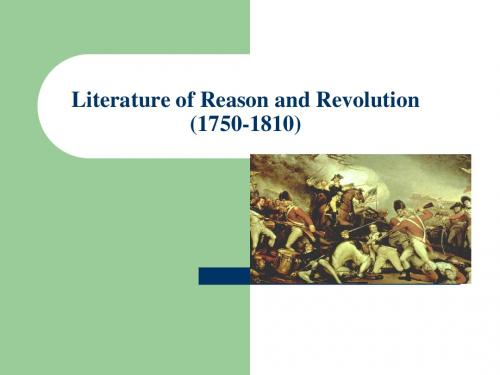
![英国文学史1[1]](https://img.taocdn.com/s1/m/213c084d2b160b4e767fcf61.png)
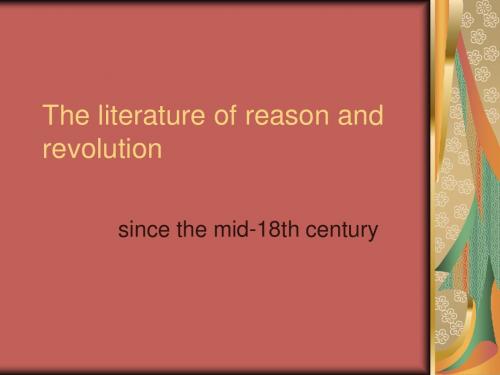
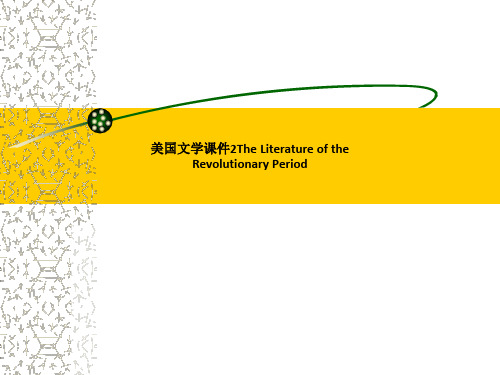
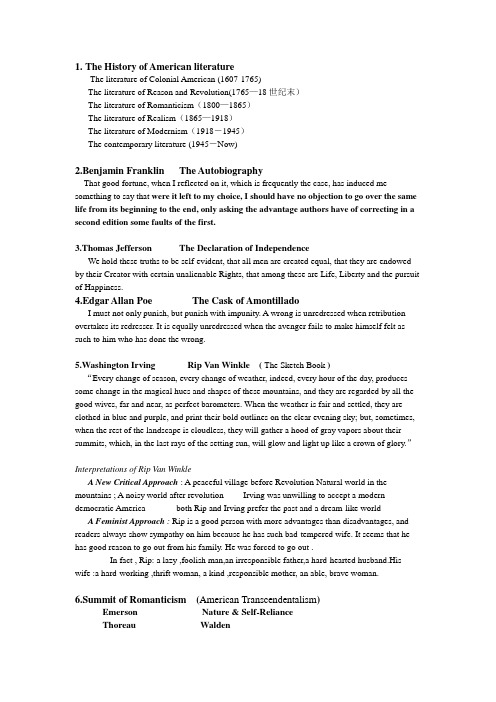
1.The History of American literatureThe literature of Colonial American (1607-1765)The literature of Reason and Revolution(1765—18世纪末)The literature of Romanticism(1800—1865)The literature of Realism(1865—1918)The literature of Modernism(1918-1945)The contemporary literature (1945-Now)2.Benjamin Franklin The AutobiographyThat good fortune, when I reflected on it, which is frequently the case, has induced me something to say that were it left to my choice, I should have no objection to go over the same life from its beginning to the end, only asking the advantage authors have of correcting in a second edition some faults of the first.3.Thomas Jefferson The Declaration of IndependenceWe hold these truths to be self-evident, that all men are created equal, that they are endowed by their Creator with certain unalienable Rights, that among these are Life, Liberty and the pursuit of Happiness.4.Edgar Allan Poe The Cask of AmontilladoI must not only punish, but punish with impunity. A wrong is unredressed when retribution overtakes its redresser. It is equally unredressed when the avenger fails to make himself felt as such to him who has done the wrong.5.Washington Irving Rip Van Winkle ( The Sketch Book )“Every change of season, every change of weather, indeed, every hour of the day, produces some change in the magical hues and shapes of these mountains, and they are regarded by all the good wives, far and near, as perfect barometers. When the weather is fair and settled, they are clothed in blue and purple, and print their bold outlines on the clear evening sky; but, sometimes, when the rest of the landscape is cloudless, they will gather a hood of gray vapors about their summits, which, in the last rays of the setting sun, will glow and light up like a crown of glory.”Interpretations of Rip Van WinkleA New Critical Approach: A peaceful village before Revolution Natural world in the mountains ; A noisy world after revolution ------Irving was unwilling to accept a modern democratic America ------both Rip and Irving prefer the past and a dream-like worldA Feminist Approach : Rip is a good person with more advantages than disadvantages, and readers always show sympathy on him because he has such bad-tempered wife. It seems that he has good reason to go out from his family. He was forced to go out .In fact , Rip: a lazy ,foolish man,an irresponsible father,a hard-hearted husband.His wife :a hard-working ,thrift woman, a kind ,responsible mother, an able, brave woman.6.Summit of Romanticism (American Transcendentalism)Emerson Nature & Self-RelianceThoreau WaldenNature : Standing on the bare ground, -- my head bathed by the blithe air, and uplifted into infinite space, -- all mean egotism vanishes. I become a transparent eye-ball; I am nothing; I see all; the currents of the Universal Being circulate through me; I am part or particle of God. The name of the nearest friend sounds then foreign and accidental: to be brothers, to be acquaintances, -- master or servant, is then a trifle and a disturbance. I am the lover of uncontained and immortal beauty. In the wilderness, I find something more dear and connate than in streets or villages.Self Reliance:Whoso would be a man, must be a nonconformist.It is easy in the world to live after the world's opinion; it is easy in solitude to live after our own; but the great man is he who in the midst of the crowd keeps with perfect sweetness the independence of solitude.Walden:1 A man is rich in proportion to the number of things which he can afford to let alone.2 I have frequently seen a poet withdraw , having enjoyed the most valuable part of a farm, while the crusty farmers supposed that he had got a few apples only.3 The hollow and lichen-covered apple trees, gnawed by rabbits, showing what kind of neighbors I should have.4 But I would say to my fellows, once for all, as long as possible live free and uncommitted. It makes but little difference whether you are committed to a farm or the country jail.5 As I have said , I do not propose to write an ode to dejection, but to brag as lustily as chanticleer in the morning, standing on his roost, if only to wake my neighbors up.6 The morning wind forever blows, the poem of creation is uninterrupted; but few are the ears that hear it.7 The Harivansa says,“An abode without birds is like a meat without seasoning.”such was not my abode, for I found myself suddenly neighbor to the birds, not by having imprisoned one, but having caged myself near them8 “There was a shepherd that did live, And held his thoughts as high .As were the mounts whereon his flocks. Did hourly feed his by”What should we think of the shepherd’s life if his flocks always wandered to higher pastures than his thoughts?Purpose : 1.escaping the effects of the Industrial Revolution by leading to a simpler life.2.simplifying life and reducing expenditures, increasing writings time3.putting into practice the Transcendentalist beliefIdeas : 1. the inner virtue and inward, spiritual grace of man.2 .was very critical of modern civilization.3.spiritual richness is real wealth7.Hawthorne The Scarlet LetterHester Prynne--1.confesses her guilty, faces the future optimistically,helps others2. able to construct her life, wins a moral success3. moral growth-----angelDimmesdale----1.hides his guilty first2.undergoes the physical and spiritual tormentsChillingworth--morally degrades by his pursuit of revengePearl----1, it means treasure ( the treasure to her mother. )2, Came out of an ugly shell but is beautifulTheme: 1 Don’t intend to tell a love story2 assumes the universalityof guilty3 explores the complexities and ambiguities of man’s choices4 focuses his attention on the moral, emotional, and psychological effects of the sin on the people.8.Longfellow A Paslm of Life / The Tide Rises, the Tide Falls / I shot an Arrow / My Lost Youth / The Rainy DayThe tide rises,The Tide Falls (1879)The tide rises, the tide falls, The twilight darkens, the curlew calls;Along the sea-sands damp and brown, The traveler hastens toward the town,And the tide rises, the tide falls.Darkness settles on roofs and walls,But the sea in the darkness calls;The little waves, with their soft white hands,Efface the footprints in the sands,And the tide rises, the tide falls.The morning breaks; the steeds in their stalls, Stamp and neigh, as the hostler calls;The day returns, but nevermore . Returns the traveler to the shore,And the tide rises, the tide falls.My Lost YouthOften I think of the beautiful townThat is seated by the sea;Often in thought go up and downThe pleasant streets of that dear old town,And my youth comes back to me.And a verse of a Lapland songIs haunting my memory still'A boy's will is the wind's will,And the thoughts of youth are long, long thoughtsI shot an arrowI shot an arrow into the air, It fell to earth, I knew not where;For, so swiftly it flew, the sight. Could not follow it in its flight.I breathed a song into the air, It fell to earth, I knew not where;For who has sight so keen and strong,That it can follow the flight of song?Long, long afterward, in an oak. I found the arrow, still unbroken;And the song, from beginning to end,I found again in the heart of a friend.9.Edgar Allan Poe To Helen Annabel Lee “The Raven”For the moon never beams without bringing me dreamsOf the beautiful ANNABEL LEE ;And the stars never rise but I see the bright eyesOf the beautiful ANNABEL LEE ;And so,all the night-tide , I lie down by the sideOf my darling —my darling —my life and my bride,In her sepulcher there by the sea—,In her tomb by the sounding sea.10.Emily Dickinson I Started Early-Took My Dog- I am NobodyTo Make a Prairie Success is counted sweetestI started Early -- Took my Dog -- And visited the Sea --The Mermaids in the Basement Came out to look at me --And Frigates -- in the Upper Floor Extended Hempen Hands --Presuming Me to be a Mouse -- Aground -- upon the Sands --But no Man moved Me -- till the Tide Went past my simple Shoe --And past my Apron -- and my Belt -- And past my Bodice -- too --And made as He would eat me up --As wholly as a Dew Upon a Dandelion's Sleeve --And then -- I started -- too -- And He -- He followed -- close behind --I felt his Silver Heel Upon my Ankle -- Then my ShoesWould overflow with Pearl --Until We met the Solid Town -- No One He seemed to know --And bowing -- with a Might look -- At me -- The Sea withdrew --1 The speaker is extremely frightened by the sea.2.The speaker also seems attracted to the sea.3. The speaker runs to town to escape the sea.4. She has a conflicted relationship to the sea.5. she is attracted to sth that frightens her---her self consciousness may mean she has some desire about which she feels guilty.Water, The seaThe unconscious, the emotions, the desire, the sexuality.The speaker’s conflicted attitude toward the sea implies a conflicted attitude toward sex (sex both attract and frightens her)11.Whitman Leaves of Grass One's Self I Sing O Captain! My Captain(free verse)The "ship" is intended to represent the United States of America, while its "fearful trip" recalls the troubles of the American Civil War. The "Captain" is Lincoln himself. (metaphor ) Rrhyme scheme : a a b b c d e d12.Mark Twain (realism) The Celebrated Jumping Frog of Calaveras CountyThe Adventure of Tom Sawyer13.Naturalism Theodore Sister CarrieStephen Crane The Open Boat1. Sister CarrieOh, Carrie, Carrie! Oh, blind strivings of the human heart! Onward, onward, it saith(say), and where beauty leads, there it follows. Whether it be the tinkle of a lone sheep bell o‘er some quiet landscape, or the glimmer of beauty in sylvan places, or the show of soul in some passing eye, the heart knows and makes answer, following. It is when the feet weary and hope seems vain that the heartaches and the longings arise. Know, then, that for you is neither surfeit(过量)nor content. In your rocking-chair, by your window dreaming, shall you long, alone. In your rocking-chair, by your window, shall you dream such happiness as you may never feel.2. The Open BoatNaturalism in the story1,The indifference of natureThe oiler was the most skilled and capable manIf nature were just, The oiler would be the last of the four men who should have died. The oiler’s death and lack of explanation surrounding it reinforce the randomness of nature’s whims and symbolize the indifference of nature toward manIn the story a bird watches them and is completely indifferent.2,The survival of the fittestWhile the cook, captain, and correspondent all depend on a manmade or naturally occurring device to help them to the shore, the oiler goes it alone, relying only on his human strength and not on his more evolved capacity for thought and strategy.The “fittest”are the men who have relied on man’s ability to intelligently adapt and create.3,Man’s insignificance and aloneness in the universeThey think the man sees them. Then they think they see two men, then a crowd and perhaps a boat being rolled down to the shore. They stubbornly think that help is on the way as the shadows lengthen and the sea and sky turn black.14.Sherwood Anderson The Triumph of The EggThe Egg’s Symbolic Meanings :1.The Egg: The Robber2.The Egg: Beautiful But Fragile American Dream3 The Egg: The Old Unsolved Riddle15.Anne Porter The Jilting of Granny Weatherall (Stream-of-Consciousness Narration)16.F. Scott Fitzgerald The Great GatsbyEast Egg represents the established aristocracy, West Egg the self-made richThe unrestrained desire for money and pleasure surpassed more noble goals.Do you think Gatsby deserves to be called “the great”?It is complicated to say Gatsby deserves to be “great”or not.For one thing, Gatsby’s capacity to dream makes him “great”. Gatsby was ambitious, hardworking, generous and passionate. He was so extremely loyal to his love Daisy that he could do anything to get Daisy back: he did shady business to earn money and social position; he threw luxurious parties just to draw Daisy’s attention; he could take the blame for a death that he did not cause. Gatsby never gave up his idealistic dream while striving for material joy. Gatsby kept on making efforts to balance the both sides. In this respect, he is great.For another thing, Gatsby never realized that Daisy wasn’t the girl he loved anymore. He is not so wise and he can not see the people clearly. Gatsby was so innocent that he staked everything on his dreams, not realizing that his dreams are unworthy of him. In this respect, He wasn’t sober enough to be great.17.Ernest Hemingway (Iceberg theory)A Clean, Well-lighted Place The Old Man and The Sea18.Modern Poetry ImagismPound In a Station of the MetroWilliam Carlos Williams Spring and All The Red Wheelbarrow so much depends upon a red wheelbarrow glazed with rain water beside the white chickens.19.Robert FrostFire And IceThe Road Not TakenStopping by Woods on a Snowy EveningWhose woods these are I think I know.His house is in the village though; (woods 象征着大自然,而village 象征着人类社会)He will not see me stopping here,To watch his woods fill up with snow (snow --- purity )My little horse must think it queer,To stop without a farmhouse near,Between the woods and frozen lake,The darkest evening of the year.He gives his harness bells a shake, (he---My horse,Personification )To ask if there is some mistake.The only other sound’s the sweep, (Alliteration )Of easy wind and downy flake.The woods are lovely, dark and deep, (Alliteration )But I have promises to keep,And miles to go before I sleep,And miles to go before I sleep.Rhyme : interlocking enclosed rhyme (aaba ,bbcb,ccdc, dddd)Rhetorical DeviceAlliteration---sound & sleep; dark & deepPersonification “he”—horse “My little horse must think it queer.”Repetition (重复) “and miles to go before I sleep, and miles to go before I sleep.( Superficial meaning: there is still a long distance before the speaker arrives at home and sleeps. Implied meaning: there are still numerous responsibilities before the speaker’s life comes to an end.SymbolismWoods--The mystery of nature; the temptations in our lifeVillage & He (the owner of the woods)—Human world & societySnow--Something of purityPromises--The unavoidable responsibilities & obligationsMiles--Long distance; the heavy duty of lifeSleep--Rest during night; the end of life (death)I am on my way--The journey of life20.Eugene O’Neill Desire Under the Elms (Abbie,Eben,Ephraim, Simeon ,Peter)21.Toni Morrison Recitatif。
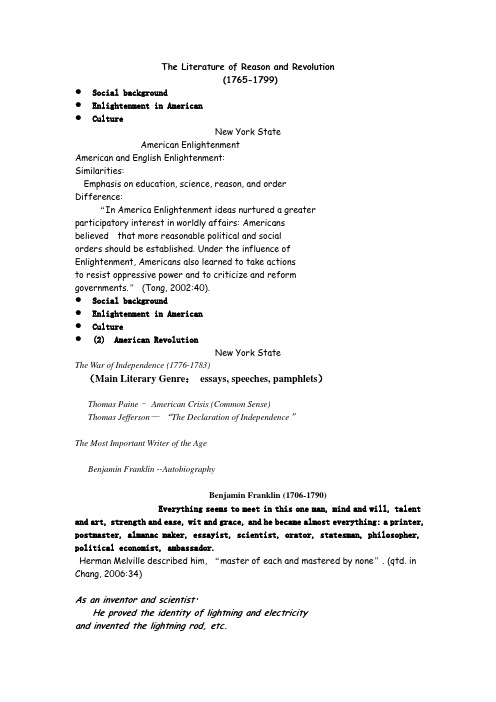
The Literature of Reason and Revolution(1765-1799)●Social background●Enlightenment in American●CultureNew York StateAmerican EnlightenmentAmerican and English Enlightenment:Similarities:Emphasis on education, science, reason, and orderDifference:“In America Enlightenment ideas nurtured a greaterparticipatory interest in worldly affairs: Americansbelieved that more reasonable political and socialorders should be established. Under the influence ofEnlightenment, Americans also learned to take actionsto resist oppressive power and to criticize and reformgovernments.”(Tong, 2002:40).●Social background●Enlightenment in American●Culture●(2) American RevolutionNew York StateThe War of Independence (1776-1783)(Main Literary Genre:essays, speeches, pamphlets)Thomas Paine–American Crisis (Common Sense)Thomas Jefferson—“The Declaration of Independence”The Most Important Writer of the AgeBenjamin Franklin --AutobiographyBenjamin Franklin (1706-1790)Everything seems to meet in this one man, mind and will, talent and art, strength and ease, wit and grace, and he became almost everything: a printer, postmaster, almanac maker, essayist, scientist, orator, statesman, philosopher, political economist, ambassador.Herman Melville described him, “master of each and mastered by none”. (qtd. in Chang, 2006:34)As an inventor and scientist:He proved the identity of lightning and electricityand invented the lightning rod, etc.As a printer:He set up his own printing press.As a statesman and diplomat:He actively participated in the American Revolution.As a writer :Autobiography 《自传》(《富兰克林自传》)Poor Richard’s Almanac 《格言历书》● Contents of Poor Richard’s Almanac:● * Calendar, weather, astronomical information,● mathematical exercise● * Proverbs●●Sayings in Poor Richard’s Almanac:●Lost time is never found again.● A penny saved is a penny found.●God help them that help themselves.●Fish and visitors stink in three days.Autobiography is a book on the art of self-improvement , an inspiring account of a poor boy’s rise to wealth and fame.Benjamin FranklinAutobiographyMemoirsfour parts; 65 years old when he wrote itContentsAn inspiring account of a poor boy’s rise to a high position.A how-to-do-it book, one on the art of self- improvement;Covering his life only until 1757 when he was 51 years old;Describing his life as a shrewd and industrious businessman;Narrating how he owned the constant felicity of his life, his long-continued health and acquisition of fortune.Featuresa Puritan documentspokesman for American EnlightenmentStylesimplicity, directness and concisionSignificancethe beginning of the subject of American Dream in literaturebegan the genre of autobiography in American lit.●Structure of the Book:●Three parts:●* The first part portrays Franklin as a young man in Boston and Philadelphia.●(Narrator: a more mature adult Franklin)●* The second part –an “art of virtue”section.●* The third part reveals how the adult Franklin uses his principles of conduct to performhis roles as a scientist and a statesman.Franklin’s 13 virtuesAutobiography:1. TEMPERANCE Eat not to dullness; drink not to elevation节制: 食不过饱,饮酒不醉2. SILENCE Speak not but what may benefit others or yourself; avoid trifling conversation.寡言: 言必与人与己有益,避免闲聊3. ORDER Let all your things have their places; let each part of your business have its time.生活秩序: 每样东西应有一定地方,每件日常事应有一定时间去做4. RESOLUTION Resolve to perform what you ought; perform without fail what you resolve.决心: 决心做的事坚持不懈5. FRUGALITY Make no expense but to do good to others or yourself; that is, waste nothing.俭朴: 用钱必须与人与己有益,避免浪费6. INDUSTRY Lose no time; be always employed in something useful; cut off allunnecessary actions.勤勉: 不浪费时间,每时每刻有事做,去掉一切不必要行动7. SINCERITY Use no hurtful deceit; think innocently and justly; speak accordingly.诚恳: 不欺骗人,思想要纯洁公正,说话也如此8. JUSTICE Wrong none by doing injuries; or omitting the benefits that are your duty.公正: 不做损人利己的事,不要忘记履行应尽的义务9. MODERATION Avoid extremes; forbear resenting injuries so much as you think they deserve.适度: 避免极端, 人若给你应得处罚, 当容忍之10. CLEANLINESS Tolerate no uncleanliness in body, clothes, or habitation.清洁: 身体衣服和住所力求清洁11. TRANQUILITY Be not disturbed at trifles or at accidents common or unavoidable.镇静: 勿因小事和不可避免的事而惊慌失措12. CHASTITY Rarely use venery but for health or offspring, never to dullness, weakness, or the injury of your own or another's peace or reputation.贞节: 绝不损害自己和他人的安宁和名誉13. HUMILITY Imitate Jesus and Socrates.谦虚: 仿效耶稣和苏格拉底●●What is it mainly about?●Experiences of reading as a child;●Experiences of becoming a printer and writing ballads;●Experiences of taking up prose writing.●Do you find the language difficult to understand?●Sentence length: mostly2-3 lines●Diction: mostly homely, simple words of Anglo-Saxon origin●Syntax: few inverted sentences●Few rhetorical devices●Significance of Franklin's Autobiography●Subject matter:●It is probably the first of its kind in Literature.● * A faithful account of the colorful life of America’s● first self-made man.* Poor and obscure* Wealthy and famous*A typical example of the fulfillment of the American Dream.●●Theme:●* A reflection of the age: a demonstration of Enlightenment.●emphasis on reason and order —13 virtues● e.g.●Temperance: Eat not to dullness and drink not to elevation.●●Order: Let all your things have their places. Let each part of●your business have its time.●* A Puritan document.●(A Record of self-examination and self-improvement)●Style:● A Exhibition of a simple, concise, direct style.●As Chang points out, “it is safe to say that the book is an exemplaryillustration of the American style of writing”(2006:34).Other Possible Themes in Franklin’s Writing● 1. Interest in the individual and society; the creation of an American nationalidentity.● 2. Tension between aristocracy and democracy; the awareness of America beingdistinct from England in values and interests.● 3. Tension between appearance and reality; shift from an other worldly to thisworldly viewpoint.● 4. Tension between romantic idealism and pragmatic rationalism.。

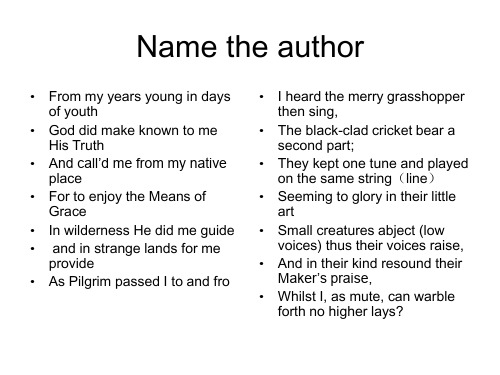
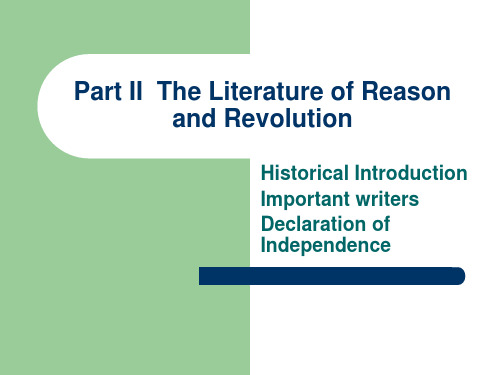
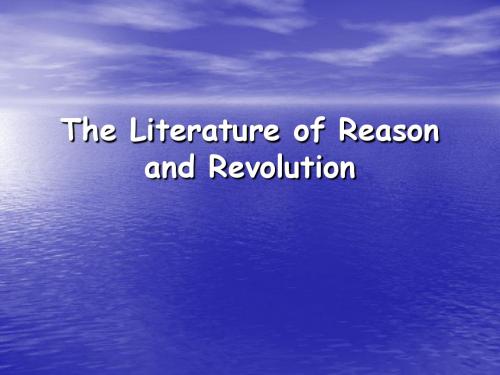

The Literature of Reason and Revolution----理性文学和革命文学[独立革命时期(1776-1783)的文学]It refers to the literary period roughly from 1776-1823 in American literatureI.BackgroundWith the settlement enlarged, colonial industry and trade developed quickly in spite of the restrictions of the English government. Most important, the economic prosperity led to inevitable social changes with the increase of newspapers, education, theater, music, poetry and all the fine arts. The economic and social changes caused diversity of opinion in religious matters and the decline of religion as well.In Europe, thinkers of the Enlightenment emancipated or enlightened people’s mind from the bondage of feudalistic chains of the Middle Ages, while in America the humanistic ideas of the movement gave a heavy blow to Puritanism in advocating science, knowledge and the power and ability of man.The English government wanted the colonies to remain politically and economically dependent on the mother country. A natural outcome was increasing tension with England. In the end, the conflict led to the Revolutionary War which resulted in American independence and produced such Revolutionary figures as George Washington, Thomas Jefferson, Benjamin Franklin and Thomas Paine.II.LiteratureThe last decades of the 18th century witnessed a gradual decline of Puritanism.While theology dominated the writings of the colonial times, politics permeated the writings of the Revolution period. The 18th century rationalists advocated a rational and scientific approach to religious, social, political and economic issues. The enlightenment, a literary moment originated from Europe had influenced the best writers of this period. One of the most famous is Benjamin Franklin whose works displayed a departure from the stock puritan belief. The period also produced Thomas Jefferson and Thomas Paine who wrote political pamphlets appropriate to an age of Revolution. The enlightenment had also influenced the literature of that period in forming a style of clarity and precision.Literature in this period consists of prose, which was political, dealing with Revolutionary issues, poetry, drama and the novel.After the United States achieved its independence, American intellectuals set out on the journey to a literary independence. However, American literature throughout the century was largely patterned on the writings of 18th century English writers, notably Franklin by Addison and Steele. Joseph Addison and Richard Steele are publishers of a moralistic journal The Spectator. III.WritersBenjamin Franklin(1706-1790)the epitome of the Age of Reason.A. Life Achievement:a great statesman, diplomat, scientist and the first major American writer. P.18-19B. Philosophical ideas:As the chief representative of the American Enlightenment, he advocated a humanistic ideal. Pragmatic and optimistic, he highly regarded science, knowledge and education and believed inthe possibilities of human progress and the comforts of material success. He was symbolic of the age he belonged to in his paradoxical faith in both social order and in natural rights, in love of stability and devotion to revolutionary change. He was the first and perhaps the last positive representation of the values of the American Dream.C. Important works1.AutobiographyHis masterpiece, but left unfinished. It not only narrates his early life, but his life principles and philosophy. It is a how-to-do-good book and sets autobiography as a literature genre in American literature.2.Poor Richard’s Almanac《穷理查德警句》An annual collection of proverbs. In this book, he created the character of “Poor Richard” with humor and homespun wisdom. It contains many entertaining and useful witty aphorisms about working hard and getting wealth. His pragmatism and a sense of humor are fully demonstrated in this work.Eg. The sayingsBeware of little expenses; a small leak will sink a great ship.Diligence is the mother of goodluck.No morning sun lasts a whole day.Lost time is never found again.God helps them that help themselvesD. Writing StyleHis prose style follows the neoclassic ideals of clarity, restraint, simplicity and balance. Wrote in plain style---- simple, concise, clear, straightforward and fluent. A subtle humor and sarcastic notion are also found in his writings.Thomas Paine (1737-1809)A.Life AchievementA “Great Commoner of Mankind”----人类伟大的平民, a most important revolutionary activist and political writer during the War of Independence and the French Revolution..B.Important Worksmon Sense《常识》A famous pamphlet appeared in 1776, which boldly advocates a Declaration forIndependence and brings the separatist agitation to a crisis.2.The American CrisisA serial of 16 pamphlets during the War that greatly restored the morale andinspired the fighting spirit of the soldiers and people of North America in times of difficulties and contained many unforgettable sentences.C.Writing StyleHis pamphlets are succinct, powerful, persuasive and aphoristic.Thomas Jefferson (1743-1826)A.Life AchievementAn important revolutionary statesman during the American War of Independence, the main drafter of The Declaration of Independence, and the third president of the United States. His democratic ideas have run into the veins of the American people generation after generation.B.Life philosophyInfluenced by the writers and philosophers of the Enlightenment, he was a fervent believer and advocator of democracy, liberty and selfhood. He held that the natural rights of man must be secured by law inalienably for all. He believed in political equality and man’s natural goodness. He also believed in the importance of education as a vital part of democracy.C.WorksThe Declaration of Independence (1776)Written in two parts, not only to explain but also justify the cause of American Revolution.D. StyleDignified, flexible, clear, lyrical and logicalPhilip Freneau (1752-1832)A.Life Achievement“the Father of American Poetry”, the first important American poet. He was a transitional literary figure from the Enlightenment to the Romantic period---the post-Revolutionary period. A political journalist.B.Subject Matter, Themes and StyleDeism---like Franklin and Jefferson, Freneau was also a typical 18th century man who believed in scientific deism. This philosophy with its ideas of man’s natural goodness and equality, the noble savage, the evil of institutions, and the idea of progress, found expression in his political satp. 42----He was neoclassical by training and taste yet romantic in essential spirit. He was also at once a satirist and a sentimentalist, a humanitarian but also a bitter polemicist, a poet of Reason yet the celebrant of “lovely Fancy,”and a deistic optimist inspired by themes of death and transience ---the circle of life and death.p.44----As a poet, he heralded American literary independence . His close observation of nature distinguished his treatment of indigenous wild life and other native American subjects. His poems were mostly lyrical and haunting in beauty, dealing with the themes of nature’s mutability, the circle of life and death, sometimes being meditations on humanity, solitude, primitivism and the supernatural.Style ---- In contrast with the ornate style of his early couplets, he later developed a natural, simple, and concrete diction. Freneau did not establish trends, but he represented qualities that were to be characteristic of the next half century---Romanticism.C.Important Poems1.“The Wild Honey Suckle”(1786)《野忍冬花》It is his most widely read natural lyric with the theme of transience----. The central image is a native wild flower, which makes a drastic difference from elite flower images typical of traditional English poems. It is used as a symbol to convey the poet’s lament for the mutability of nature. It is meditative, sharp, delicate and restrained in tone and diction Abittersweet awareness of the transience of beauty permeates the poem.2.“The Indian Burying Ground”(1788)《印第安人的坟墓》It is another poetic description of native subjects----the Indians. The poem describes the way that American Indians bury their dead in sitting posture, which according to the poet, signifies the returning of the soul. In this poem, beauty, fancy, awe, death and eternity are harmoniously interwoven. The poem captures the poet’s feeling of respect for the noble savage.这是考验人的灵魂的时代。

黑格尔美学第二卷英语版Hegel's Aesthetics: Volume IIIn the second volume of Hegel's seminal work on aesthetics, the renowned German philosopher delves deeper into the intricate realm of art and its philosophical implications. Hegel's profound insights have long been celebrated as a cornerstone of Western intellectual tradition, and this volume stands as a testament to his unparalleled depth of understanding.At the heart of Hegel's aesthetic theory lies the notion that art is a manifestation of the Absolute Spirit the ultimate expression of the human experience and the collective consciousness of humanity. Through the lens of art Hegel explores the development of human civilization and the evolution of the human spirit itselfHegel's analysis begins with a comprehensive examination of the various forms of art ranging from the symbolic to the romantic and the classical. He meticulously dissects each artistic medium exploring its unique characteristics and the ways in which it reflects the underlying spirit of the age. From the grand architectural works of antiquity to the transcendent masterpieces of painting and sculptureHegel unravels the complex interplay between form and content revealing the deeper philosophical truths that lie beneath the surfaceOne of the central tenets of Hegel's aesthetic theory is the idea that art serves as a bridge between the material and the spiritual realms. He posits that through the creative process the artist is able to give tangible form to the abstract ideas and emotions that lie within the human psyche. In this way art becomes a means of expressing the inexpressible a language that can convey the profound and the ineffableHegel's discussion of the historical development of art is particularly insightful as he traces the evolution of artistic expression from its earliest manifestations in ancient civilizations to its modern incarnations. He examines how the changing social political and cultural landscapes have shaped the artistic impulse and how artists have in turn influenced the course of human historyThe philosopher's analysis of the nature of beauty is equally compelling as he grapples with the question of what constitutes the essence of the beautiful. Hegel rejects the notion of beauty as a purely subjective experience arguing instead that it is a synthesis of the objective and the subjective a harmonious unity of form and content that transcends individual taste and preferenceThroughout the volume Hegel's erudition and intellectual rigor are on full display as he weaves together strands of philosophy history and art in a tapestry of profound insight. His writing is at once accessible and deeply thought-provoking as he challenges the reader to engage with the fundamental questions that lie at the heart of the human experienceUltimately Hegel's Aesthetics Volume II stands as a monumental contribution to the field of philosophical aesthetics a work that has left an indelible mark on the way we perceive and understand the role of art in the human condition. Whether one agrees with Hegel's conclusions or not his ideas have undoubtedly helped to shape the course of Western intellectual thought and will continue to inspire and provoke critical discourse for generations to come。
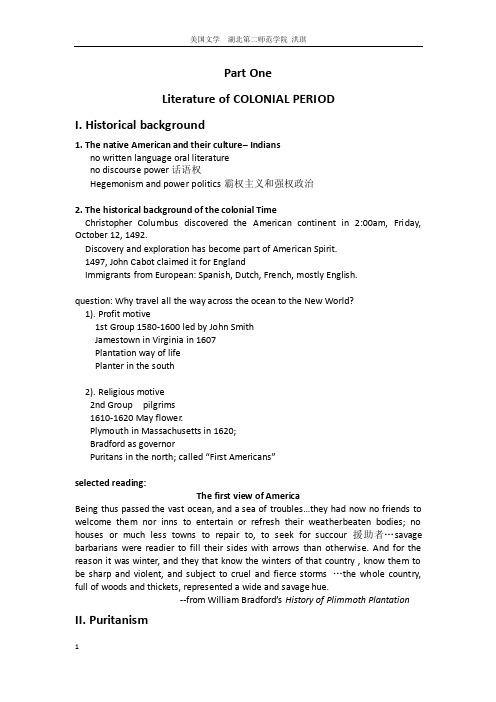
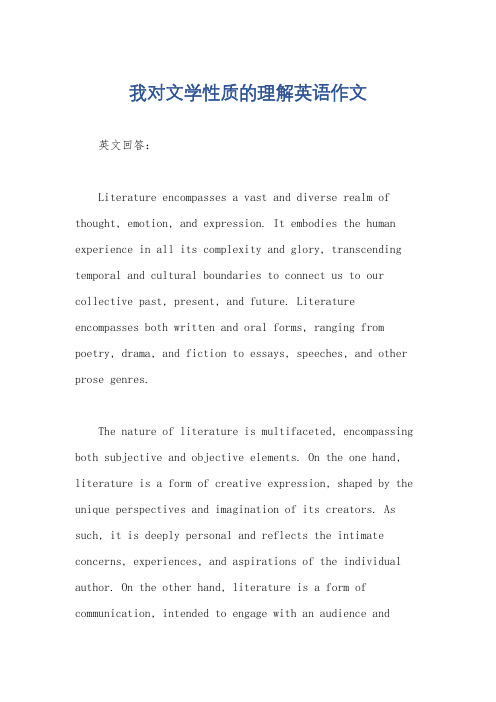
我对文学性质的理解英语作文英文回答:Literature encompasses a vast and diverse realm of thought, emotion, and expression. It embodies the human experience in all its complexity and glory, transcending temporal and cultural boundaries to connect us to our collective past, present, and future. Literature encompasses both written and oral forms, ranging from poetry, drama, and fiction to essays, speeches, and other prose genres.The nature of literature is multifaceted, encompassing both subjective and objective elements. On the one hand, literature is a form of creative expression, shaped by the unique perspectives and imagination of its creators. As such, it is deeply personal and reflects the intimate concerns, experiences, and aspirations of the individual author. On the other hand, literature is a form of communication, intended to engage with an audience andelicit a response. It is shaped by social and cultural contexts, reflecting the collective experiences, beliefs, and values of a particular time and place.The subjective nature of literature is evident in its use of language. Language is the medium through which literature communicates its message, but it is also a flexible and malleable tool that can be molded to create infinite possibilities of meaning. Authors use language creatively, employing metaphors, similes, and otherliterary devices to evoke vivid imagery, create suspense, and convey complex emotions. In doing so, they invite readers to participate in the creative process, tointerpret and respond to the text in their own unique way.The objective nature of literature is reflected in its ability to transcend personal experiences and connect with readers on a universal level. Literature explores fundamental questions about human nature, morality, and the meaning of life. It often depicts characters and situations that are recognizable and relatable, allowing readers to identify with the struggles, joys, and aspirations ofothers. Through literature, we can gain insights into ourselves and the world around us, developing empathy, understanding, and a broader perspective on the human condition.Literature also plays a vital role in shaping our cultural identity and collective memory. Literary works preserve and transmit cultural traditions and values from one generation to the next. They reflect the social and historical context in which they were created, providing a valuable window into past ways of life and thought. By studying literature, we can learn about our own history, culture, and the experiences of those who came before us.Furthermore, literature has an inherent educational value. It exposes us to different perspectives, challenges our assumptions, and expands our knowledge of the world. Through literature, we can learn about history, science, philosophy, and other disciplines in a way that is engaging and memorable. Literature fosters critical thinking skills, develops our imagination, and cultivates an appreciationfor beauty and expression.In conclusion, the nature of literature is both subjective and objective, encompassing both creative expression and communication. It uses language in creative and innovative ways to evoke vivid imagery, create suspense, and convey complex emotions. Literature transcends personal experiences to connect with readers on a universal leveland plays a vital role in shaping our cultural identity and collective memory. It has an inherent educational value and fosters critical thinking skills, imagination, and an appreciation for beauty and expression.中文回答:文学的本质是一个博大精深的领域,涉及思想、情感和表达。
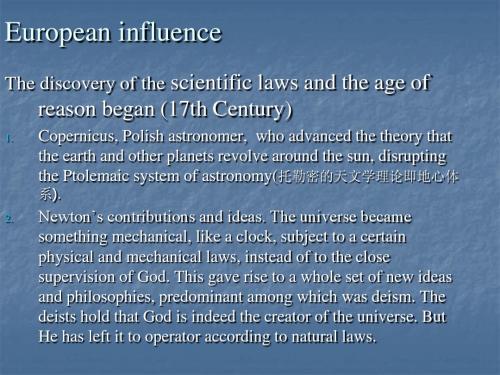
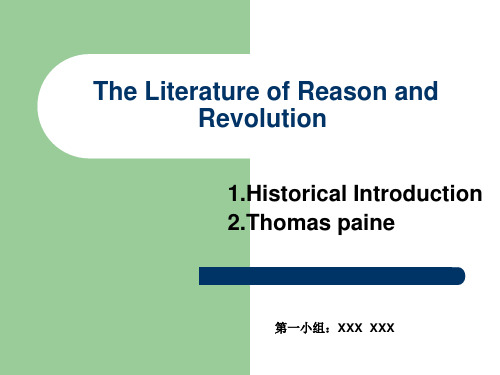
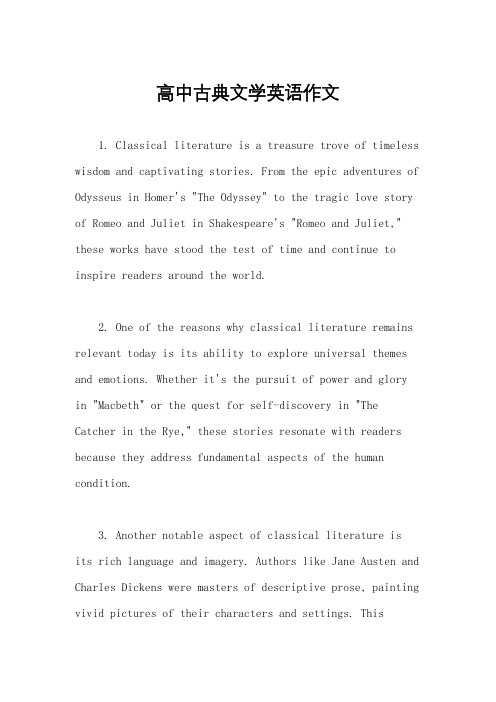
高中古典文学英语作文1. Classical literature is a treasure trove of timeless wisdom and captivating stories. From the epic adventures of Odysseus in Homer's "The Odyssey" to the tragic love story of Romeo and Juliet in Shakespeare's "Romeo and Juliet," these works have stood the test of time and continue to inspire readers around the world.2. One of the reasons why classical literature remains relevant today is its ability to explore universal themes and emotions. Whether it's the pursuit of power and gloryin "Macbeth" or the quest for self-discovery in "The Catcher in the Rye," these stories resonate with readers because they address fundamental aspects of the human condition.3. Another notable aspect of classical literature isits rich language and imagery. Authors like Jane Austen and Charles Dickens were masters of descriptive prose, painting vivid pictures of their characters and settings. Thisattention to detail not only enhances the readingexperience but also allows readers to immerse themselves in the world of the story.4. In addition to its literary value, classicalliterature also provides valuable insights into thehistorical and cultural contexts in which they were written. Works like "Pride and Prejudice" offer a glimpse into the social norms and expectations of 19th-century England,while "The Great Gatsby" captures the essence of theRoaring Twenties in America. By studying these works, wecan gain a deeper understanding of the past and how it has shaped the present.5. Classical literature also serves as a source of inspiration for contemporary writers and artists. Many modern works, such as Margaret Atwood's "The Handmaid's Tale" and the film adaptation of "Les Misérables," draw inspiration from classical texts. By building upon the themes and ideas explored in these works, contemporary creators are able to create new and thought-provoking narratives.6. Finally, classical literature offers a form of escapism from the realities of everyday life. Whether it's getting lost in the magical world of Harry Potter or embarking on a thrilling adventure with Bilbo Baggins in "The Hobbit," these stories provide a much-needed break from the monotony of daily routines and transport readers to different worlds and time periods.In conclusion, classical literature continues to captivate readers with its timeless wisdom, universal themes, rich language, historical insights, and ability to inspire contemporary works. It serves as a reminder of the power of storytelling and its ability to transcend time and connect people across cultures and generations.。
Part II. The Literature of Reason and RevolutionI. Fill in the blanks.1. The War of Independence lasted eight years till_____.2. The United States of America was founded in _____.3. Benjamin Franklin also edited the first colonial magazine, which he called _____.4. Benjamin Franklin' s best writing is found in his masterpiece ________ .5. Thomas Paine, with his natural gift for pamphleteering and rebellion, was appropriately born into an age of____________ .6. On January 10, 1776, Thomas Paine's famous pamphlet ________ appeared.7. A series of sixteen pamphlets by Thomas Paine was entitled _____________ .8. Thomas Paine's second most important work_____________ was an impassioned plea against hereditary monarchy.9. The most outstanding poet in America of the 18th century was _____________ .10. Philip Freneau' s famous poem____________ was written about his imprisoned experience.11. ___________ was considered as the " poet of the American Revolution. "12. _________ has been called the "Father of American Poetry. "13.In 1791, probably with Thomas Jefferson's support, ___________ established in Philadelphia the National Gazette.14. In American literature, the eighteenth century was an Age of _________ and Revolution.15. The Calvinist beliefs brought about the Great Awakening during the 1730s and 1740s. _________ was the most influential among the believers.16. Jonathan Edwards' work Images or Shadows of Divine Things anticipated the nature symbolism of___________ in the 19th century.17. If we say Jonathan Edwards represents the upper levels of the American mind, _________ represents the lower levels.II. Decide whether the statements are true or false.1. The War of Independence lasted for eight years and ended in the formation of a Federative bourgeois democratic republic, that is, the United States of America.2. The War of Independence was a revolution, but it was the bourgeoisie that reaped its fruits. The rulers of the new state were hostile to the laboring peo-ple.3. At the initial period the spread of ideas of the American Enlightenment was largely due to journalism.4. Benjamin Franklin seemed to represent the age of reason and revolution in his paradoxical faith in both social order and in natural rights, in love of sta-bility and devotion to revolutionary change.5. Benjamin Franklin was a prose stylist whose writing reflected the neoclassic ideals of clarity, restraint, simplicity and balance.6. Benjamin Franklin was the epitome of the Enlightenment, the versatile, practical embodiment of rational man in the 18th century.7. In Philadelphia, Benjamin Franklin edited Pennsylvania Magazine, and contributed to Pennsylvania Journal.8. Common Sense boldly advocated a Declaration of Independence.9. For the pamphlet Common Sense, Thomas Paine was charged with treason and fled to France,10. Thomas Paine also edited the first colonial magazine The General Maga-zine.11. Philip Freneau was the most important writer in American poetry of the eighteenth century.12. American poetry of the eighteenth century has an imitative character, imita-ting the reigning English models of the eighteenth century.13. Philip Freneau was a close friend and political associate of President Thom- as Jefferson.14. Philip Freneau was once captured by the British and spent some time on a prison ship.15. Philip Freneau wrote impassioned verse in support of the American Revolu-tion.16. Like Thomas Paine, Philip Freneau was a strong supporter of the French Revolution.17. Philip Freneau was noteworthy first because of the nature of his poems. They were truly American and very patriotic. In this aspect, he reflected the spirit of his age.18. Philip Freneau was neoclassical by training and taste yet romantic in essen-tial spirit.19. Most American literature in the eighteenth century was political.20. During the 1770s no one in America could claim to be a professional novelist, poet, or playwright.III. Make multiple choices.1. In American literature, the eighteenth century was the age of the Enlightenment. _________ was the dominant spirit.A. HumanismB. RationalismC. RevolutionD. Evolution2. In American literature, the Enlighteners were opposed to ________ .A. the colonial orderB. religious obscurantismC. the Puritan traditionD. the secular literature3. The English colonies in North America rose in arms against their parent country and the Continental Congress adopted____________ in 1776.A. the Declaration of IndependenceB. the Sugar ActC. the Stamp ActD. the Mayflower Compact4. Which statement about Benjamin Franklin is not true?A. He instructed his countrymen as a printer.B. He was a scientist.C. He was a master of diplomacy.D. He was a Puritan.5. The secular ideals of the American Enlightenment were exemplified in the life and career of___________ .A. Thomas HoodB. Benjamin FranklinC. Thomas JeffersonD. George Washington6. Which of the following stirred the world and helped form the American republic?A. The American CrisisB. The FederalistC. Declaration of IndependenceD. The Waste Land7. Benjamin Franklin was the epitome of the____________ .A. American EnlightenmentB. Sugar ActC. Chartist movementD. Romanticist8. From 1732 to 1758, Benjamin Franklin wrote and published his famous __________ , an annual collection of proverbs.A. The AutobiographyB. Poor Richard's AlmanacC. Common SenseD. The General Magazine9. Which is not connected with Thomas Paine?A. Common SenseB. The American CrisisC. Pennsylvania MagazineD. The Autobiography10. Choose the works written by Thomas Paine.A. Rights of ManB. The Age of ReasonC. Agrarian JusticeD. Common SenseE. The American Crisis1l. The first pamphlet published in America to urge immediate independence from Britain is__________ .A. The Rights of ManB. Common SenseC. The American CrisisD. Declaration of Independence12. "These are the times that try men' s souls", these words were once read to George Washington' s troops and did much to shore up the spirits of the revolu-tionary soldiers. Who is the author of these words?A. Benjamin FranklinB. Thomas JeffersonC. Thomas PaineD. George Washington13. Which statement about Philip Freneau is true?A. He was a satirist.B. He was a pamphleteer.C. He was a poet.D. He was a bitter polemicist.14. Which poem is not written by Philip Freneau?A. The British Prison ShipB. The Wild Honey SuckleC. The Indian Burying GroundD. The Day of Doom15. Who was considered as the "Poet of American Revolution"?A. Michael WigglesworthB. Edward TaylorC. Anne BradstreetD. Philip Freneau16. It was not until January 1776 that a widely heard public voice demanded com-plete separation from England. The voice was that of________ , whose pamphlet Common Sense, with its heated language, increased the growing de-mand for separation.A. Thomas PaineB. Thomas JeffersonC. George WashingtonD. Patrick Henry17. During the Reason and Revolution Period, Americans were influenced by the European movement called the____________ .A. Chartist MovementB. Romanticist MovementC. Enlightenment MovementD. Modernist Movement18. Thomas Jefferson' s attitude, that is, a firm belief in progress, and the pursuit of happiness, is typical of the period we now call _________ .A. Age of EvolutionB. Age of ReasonC. Age of RomanticismD. Age of Regionalism19. __________ carries the voice not of an individual but of a whole people. It is more than writing of the Revolutionary period, it defined the meaning of the American Revolution.A. Common SenseB. The American CrisisC. Declaration of IndependenceD. Defence of the English People20. Benjamin Franklin shaped his writing after the______________ of the English es-sayists Joseph Addison and Richard Steele.A. Spectator PapersB. WaldenC. NatureD. The Sacred WoodIV. Identify the fragments.Passage OneThese are the times that try men' s souls: The summer soldier and the sunshine patriot will in this crisis, shrink from the service of their country; but he that stands it now, deserves the love and thanks of man and woman. Tyranny, like hell, is not easily conquered; yet we have this consolation with us, that the harder the conflict, the more glorious the triumph. What we obtain too cheap, we esteem too lightly—This dearness only that gives everything its value. Heaven knows how to put a proper price upon its goods.Questions:1) Which book is this passage taken from?2) Who is the author of this book?3) Whom is the author praising? Whom is the author criticizing?4) What do you think of the language?Passage TwoWhen in the course of human events, it becomes necessary for one people to dissolve the political bands which have connected them with another, and to assume among the powers of the earth, the separate and equal station to which the Laws of Nature and of Nature' s God entitle them, a decent respect to the opinions of man-kind requires that they should declare the causes which impel them to the separa-tion.We hold these truths to be self-evident, that all men are endowed by their Cre-ator with certain unalienable Rights, that among these are Life, Liberty and the pur-suit of Happiness? That to secure these rights, Governments are instituted among Men, deriving their just powers from the consent of the governed; That whenever any Form of Government becomes destructive of these ends, it is the Right of the People to alter or to abolish it.Questions:1) Which work is this passage taken from?2) What truths are self-evident? What is the purpose of government, and when should a government be replaced?Passage ThreeIn a branch of willow hidSings the evening Caty-did:From the lofty locust boughFeeding on a drop of dew,In her suit of green array' dHear her singing in the shadeCaty-did, Caty-did, Caty-did!Questions:1) Who is the writer of these verses?2) What is the title of this lyrical poem?3) What is a "Caty-did"?V. Analyze the main works.1. Analyze The American Crisis.2. Analyze Declaration of Independence.。